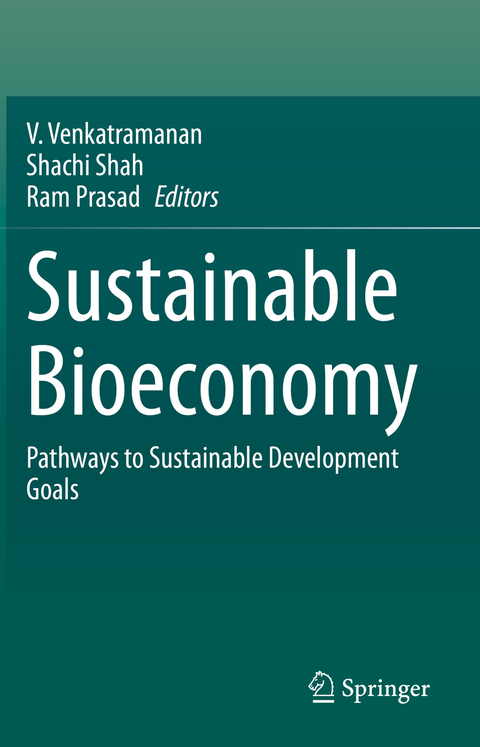
Sustainable Bioeconomy
Springer Verlag, Singapore
978-981-15-7323-1 (ISBN)
V. Venkatramanan, Ph.D. is an Assistant Professor at the School of Interdisciplinary and Transdisciplinary Studies, Indira Gandhi National Open University, New Delhi. His interests include climate smart agriculture, climate policy, biodegradation and green technologies for environmental management. He has published more than 20 research papers in peer-reviewed journals, and several book chapters. Shachi Shah, Ph.D. is an environmentalist with nearly two decades of teaching and research experience at various respected universities and institutes. Currently an Associate Professor of Environmental Studies at the School of Interdisciplinary and Transdisciplinary Studies, IGNOU, New Delhi, her research interests include green technologies for waste management and energy generation, bioremediation, waste valorization, plant growth promoting organisms, and biodiversity conservation. She has authored more than 50 publications. Ram Prasad, Ph.D. is associatedwith Department of Botany, Mahatma Gandhi Central University, Motihari, Bihar, India. His research interests include applied & environmental microbiology, plant-microbe interactions, sustainable agriculture and nanobiotechnology. Dr. Prasad has more than 150 publications to his credit, including research papers, review articles & book chapters, five patents issued or pending, and has edited or authored several books. Dr. Prasad has twelve years of teaching experience and has been awarded the Young Scientist Award & Prof. J.S. Datta Munshi Gold Medal by the International Society for Ecological Communications; an FSAB fellowship by the Society for Applied Biotechnology; the American Cancer Society UICC International Fellowship for Beginning Investigators, USA; Outstanding Scientist Award in the Field of Microbiology by Venus International Foundation; BRICPL Science Investigator Award and Research Excellence Award etc. Dr. Prasad has previously served as an Assistant Professor at Amity University Uttar Pradesh, India; Visiting Assistant Professor, Whiting School of Engineering, Department of Mechanical Engineering at Johns Hopkins University, Baltimore, USA; and Research Associate Professor at the School of Environmental Science and Engineering, Sun Yat-sen University, Guangzhou, China. He is currently an editorial board member for several journals, e.g. Frontiers in Microbiology, Frontiers in Nutrition, and Archives of Phytopathology and Plant Protection, and Series editor of Nanotechnology in the Life Sciences, Springer Nature, USA.
Chapter 1. Exploring the economics of the circular bioeconomy.- Chapter 2.The role of culture and moral responsibility in facilitating a sustainable bioeconomy.- Chapter 3. Social and economic contribution of the bioeconomic sector in Ecuador: A methodological approach.- Chapter 4. Biobutanol Production from Agricultural Biomass.- Chapter 5. Valorization of biowastes into food, fuels and chemicals - towards sustainable environment, economy and society.- Chapter 6. Sustainable biorefinery technologies for agro-residues: challenges and perspectives.- Chapter 7. Biotechnological Interventions for Production of Flavour and Fragrance Compounds.- Chapter 8. Phytochemicals for the management of stored product insects.- Chapter 9. Assessing the impact of indigenous knowledge systems on sustainable agriculture: A case study of the selected communities in the City of Tshwane Metropolitan, Gauteng Province, South Africa.- Chapter 10. Tropical biological natural resource management through integrated bio-cycles farming system.- Chapter 11. Biopesticides for Pest management.- Chapter 12. Renewable energy for a low carbon future: Policy perspectives.- Chapter 13. TNAU Energy Soft 2016: An efficient energy audit tool to identify energy saving technologies for sustainable agriculture.- Chapter 14.Mechanism for Improving the Sustainability of Homestead Food Gardens in the Gauteng Province, South Africa.- Chapter 15. Assessment of Potassium Nutrient Balance in Agricultural Farming System: A Pathway to Sustainable Production of Crops.
| Erscheinungsdatum | 12.11.2021 |
|---|---|
| Zusatzinfo | 50 Illustrations, color; 16 Illustrations, black and white; XIII, 337 p. 66 illus., 50 illus. in color. |
| Verlagsort | Singapore |
| Sprache | englisch |
| Maße | 155 x 235 mm |
| Themenwelt | Naturwissenschaften ► Biologie ► Ökologie / Naturschutz |
| Naturwissenschaften ► Geowissenschaften | |
| Recht / Steuern ► EU / Internationales Recht | |
| Recht / Steuern ► Öffentliches Recht ► Umweltrecht | |
| Sozialwissenschaften ► Politik / Verwaltung | |
| Schlagworte | Biomass energy • circular economy • climate change • global climate change • natural resources and energy economics • Sustainable bioeconomy • Sustainable Development Goals • Waste biorefineries |
| ISBN-10 | 981-15-7323-9 / 9811573239 |
| ISBN-13 | 978-981-15-7323-1 / 9789811573231 |
| Zustand | Neuware |
| Haben Sie eine Frage zum Produkt? |
aus dem Bereich


